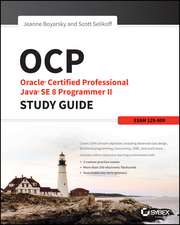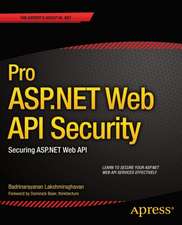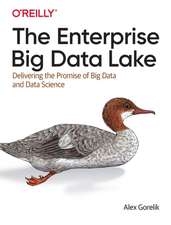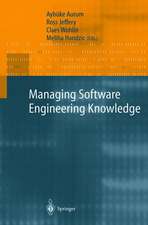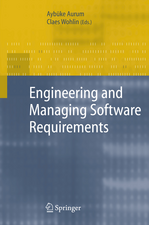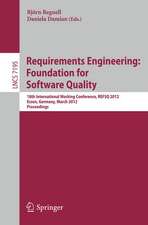Experimentation in Software Engineering
Autor Claes Wohlin, Per Runeson, Martin Höst, Magnus C. Ohlsson, Björn Regnell, Anders Wesslénen Limba Engleză Paperback – 18 iul 2014
The purpose of Experimentation in Software Engineering is to introduce students, teachers, researchers, and practitioners to empirical studies in software engineering, using controlled experiments. The introduction to experimentation is provided through a process perspective, and the focus is on the steps that we have to go through to perform an experiment. The book is divided into three parts. The first part provides a background of theories and methods used in experimentation. Part II then devotes one chapter to each of the five experiment steps: scoping, planning, execution, analysis, and result presentation. Part III completes the presentation with two examples. Assignments and statistical material are provided in appendixes. Overall the book provides indispensable information regarding empirical studies in particular for experiments, but also for case studies, systematic literature reviews, and surveys. It is a revision of the authors’ book, which was published in 2000. In addition, substantial new material, e.g. concerning systematic literature reviews and case study research, is introduced.
The book is self-contained and it is suitable as a course book in undergraduate or graduate studies where the need for empirical studies in software engineering is stressed. Exercises and assignments are included to combine the more theoretical material with practical aspects. Researchers will also benefit from the book, learning more about how to conduct empirical studies, and likewise practitioners may use it as a “cookbook” when evaluating new methods or techniques before implementing them in their organization.
| Toate formatele și edițiile | Preț | Express |
|---|---|---|
| Paperback (3) | 329.11 lei 43-57 zile | |
| Springer Us – 28 oct 2012 | 329.11 lei 43-57 zile | |
| Springer Berlin, Heidelberg – 18 iul 2014 | 341.62 lei 38-44 zile | |
| Springer Berlin, Heidelberg – 5 sep 2024 | 531.94 lei 43-57 zile | |
| Hardback (1) | 536.22 lei 43-57 zile | |
| Springer Berlin, Heidelberg – 17 iun 2012 | 536.22 lei 43-57 zile |
Preț: 341.62 lei
Preț vechi: 427.02 lei
-20% Nou
Puncte Express: 512
Preț estimativ în valută:
65.39€ • 71.05$ • 54.96£
65.39€ • 71.05$ • 54.96£
Carte tipărită la comandă
Livrare economică 16-22 aprilie
Preluare comenzi: 021 569.72.76
Specificații
ISBN-13: 9783642432262
ISBN-10: 3642432263
Pagini: 260
Ilustrații: XXIV, 236 p.
Dimensiuni: 155 x 235 x 17 mm
Greutate: 0.37 kg
Ediția:2012
Editura: Springer Berlin, Heidelberg
Colecția Springer
Locul publicării:Berlin, Heidelberg, Germany
ISBN-10: 3642432263
Pagini: 260
Ilustrații: XXIV, 236 p.
Dimensiuni: 155 x 235 x 17 mm
Greutate: 0.37 kg
Ediția:2012
Editura: Springer Berlin, Heidelberg
Colecția Springer
Locul publicării:Berlin, Heidelberg, Germany
Public țintă
GraduateCuprins
Part I Background.- Introduction.- Empirical Strategies.- Measurement.- Systematic Literature Reviews.- Case Studies.- Experiment Process.- Part II Steps in the Experiment Process.- Scoping.- Planning.- Operation.- Analysis and Interpretation.- Presentation and Package.- Part III Example Experiments.- Experiment Process Illustration.- Are the Perspectives Really Different?.- Appendices.- Exercises.- Statistical Tables.
Recenzii
From the reviews:
"The revised edition includes new chapters and examples, which further cements its place as the premier book on the topics of designing, constructing, executing, and assessing experiments in software engineering. (...) The revisions will make this book even more valuable. (...) It ought to be required reading for all PhD students; every academic’s bookcase should have a copy." (Michael Oudshoorn, Computing Reviews, October, 2012)
“This book is a landmark in allowing us to train both the researcher and practitioner in software engineering experimentation.” (Victor R. Basili, University of Maryland, MD, USA)
“The additions and modifications in this revised version very nicely reflect the maturation of the field of empirical software engineering.” (Anneliese A. Andrews, University of Denver , CO, USA)
“The volume, a revised edition of a work by the same name … published in 2000, presents a very useful review of methods in software engineering research. It is structured as a textbook, making it useful for an introductory graduate-level course or a fourth-year course at the undergraduate level. Practitioners and experts will also benefit from this book, as they can use it as a starting point for more in-depth approaches. … Summing Up: Highly recommended. Upper-division undergraduates through professionals/practitioners.” (L. Benedicenti, Choice, Vol. 50 (9), May, 2013)
"The revised edition includes new chapters and examples, which further cements its place as the premier book on the topics of designing, constructing, executing, and assessing experiments in software engineering. (...) The revisions will make this book even more valuable. (...) It ought to be required reading for all PhD students; every academic’s bookcase should have a copy." (Michael Oudshoorn, Computing Reviews, October, 2012)
“This book is a landmark in allowing us to train both the researcher and practitioner in software engineering experimentation.” (Victor R. Basili, University of Maryland, MD, USA)
“The additions and modifications in this revised version very nicely reflect the maturation of the field of empirical software engineering.” (Anneliese A. Andrews, University of Denver , CO, USA)
“The volume, a revised edition of a work by the same name … published in 2000, presents a very useful review of methods in software engineering research. It is structured as a textbook, making it useful for an introductory graduate-level course or a fourth-year course at the undergraduate level. Practitioners and experts will also benefit from this book, as they can use it as a starting point for more in-depth approaches. … Summing Up: Highly recommended. Upper-division undergraduates through professionals/practitioners.” (L. Benedicenti, Choice, Vol. 50 (9), May, 2013)
Notă biografică
CLAES WOHLIN is a professor of software engineering at Blekinge Institute of Technology. His research interests include empirical methods in software engineering, software processes and software quality. He is a member of the Royal Swedish Academy of Engineering Sciences and a senior member of the IEEE.
PER RUNESON is a professor of software engineering at Lund University. His research interests include empirical research on software testing and quality, and methods for such research. Prior to this, he worked as a consulting expert in industry, and he is a senior member of the IEEE.
MARTIN HÖST is a professor of software engineering at Lund University. His research interests include software quality and software process improvement, as well as empirical research methods in software engineering.
MAGNUS C. OHLSSON is a quality assurance specialist at System Verification AB in Malmö, focusing on process improvement. His primary field of interest is verification andvalidation, with an emphasis on achieving proper quality efficiently throughout every step of the development process.
BJÖRN REGNELL is a professor of software engineering at Lund University. His research interests include software requirement engineering, software product management, and empirical research on software engineering.
ANDERS WESSLÉN is a senior system architect at ST-Ericsson in Lund. His focus is on system-wide architectures, as well as system design and requirements.
PER RUNESON is a professor of software engineering at Lund University. His research interests include empirical research on software testing and quality, and methods for such research. Prior to this, he worked as a consulting expert in industry, and he is a senior member of the IEEE.
MARTIN HÖST is a professor of software engineering at Lund University. His research interests include software quality and software process improvement, as well as empirical research methods in software engineering.
MAGNUS C. OHLSSON is a quality assurance specialist at System Verification AB in Malmö, focusing on process improvement. His primary field of interest is verification andvalidation, with an emphasis on achieving proper quality efficiently throughout every step of the development process.
BJÖRN REGNELL is a professor of software engineering at Lund University. His research interests include software requirement engineering, software product management, and empirical research on software engineering.
ANDERS WESSLÉN is a senior system architect at ST-Ericsson in Lund. His focus is on system-wide architectures, as well as system design and requirements.
Textul de pe ultima copertă
Like other sciences and engineering disciplines, software engineering requires a cycle of model building, experimentation, and learning. Experiments are valuable tools for all software engineers who are involved in evaluating and choosing between different methods, techniques, languages and tools.
The purpose of Experimentation in Software Engineering is to introduce students, teachers, researchers, and practitioners to empirical studies in software engineering, using controlled experiments. The introduction to experimentation is provided through a process perspective, and the focus is on the steps that we have to go through to perform an experiment. The book is divided into three parts. The first part provides a background of theories and methods used in experimentation. Part II then devotes one chapter to each of the five experiment steps: scoping, planning, execution, analysis, and result presentation. Part III completes the presentation with two examples. Assignments and statistical material are provided in appendixes. Overall the book provides indispensable information regarding empirical studies in particular for experiments, but also for case studies, systematic literature reviews, and surveys. It is a revision of the authors’ book, which was published in 2000. In addition, substantial new material, e.g. concerning systematic literature reviews and case study research, is introduced.
The book is self-contained and it is suitable as a course book in undergraduate or graduate studies where the need for empirical studies in software engineering is stressed. Exercises and assignments are included to combine the more theoretical material with practical aspects. Researchers will also benefit from the book, learning more about how to conduct empirical studies, and likewise practitioners may use it as a “cookbook” when evaluating new methods or techniques before implementing them in their organization.
The purpose of Experimentation in Software Engineering is to introduce students, teachers, researchers, and practitioners to empirical studies in software engineering, using controlled experiments. The introduction to experimentation is provided through a process perspective, and the focus is on the steps that we have to go through to perform an experiment. The book is divided into three parts. The first part provides a background of theories and methods used in experimentation. Part II then devotes one chapter to each of the five experiment steps: scoping, planning, execution, analysis, and result presentation. Part III completes the presentation with two examples. Assignments and statistical material are provided in appendixes. Overall the book provides indispensable information regarding empirical studies in particular for experiments, but also for case studies, systematic literature reviews, and surveys. It is a revision of the authors’ book, which was published in 2000. In addition, substantial new material, e.g. concerning systematic literature reviews and case study research, is introduced.
The book is self-contained and it is suitable as a course book in undergraduate or graduate studies where the need for empirical studies in software engineering is stressed. Exercises and assignments are included to combine the more theoretical material with practical aspects. Researchers will also benefit from the book, learning more about how to conduct empirical studies, and likewise practitioners may use it as a “cookbook” when evaluating new methods or techniques before implementing them in their organization.
Caracteristici
The premiere book on how to systematically conduct and evaluate experiments in software engineering The authors are an experienced team of researchers and practitioners with more than eighty years of combined experience with empirical studies Self-contained presentation of experimentation and its process steps, and enriched by chapters on case studies and systematic literature reviews Includes supplementary material: sn.pub/extras



